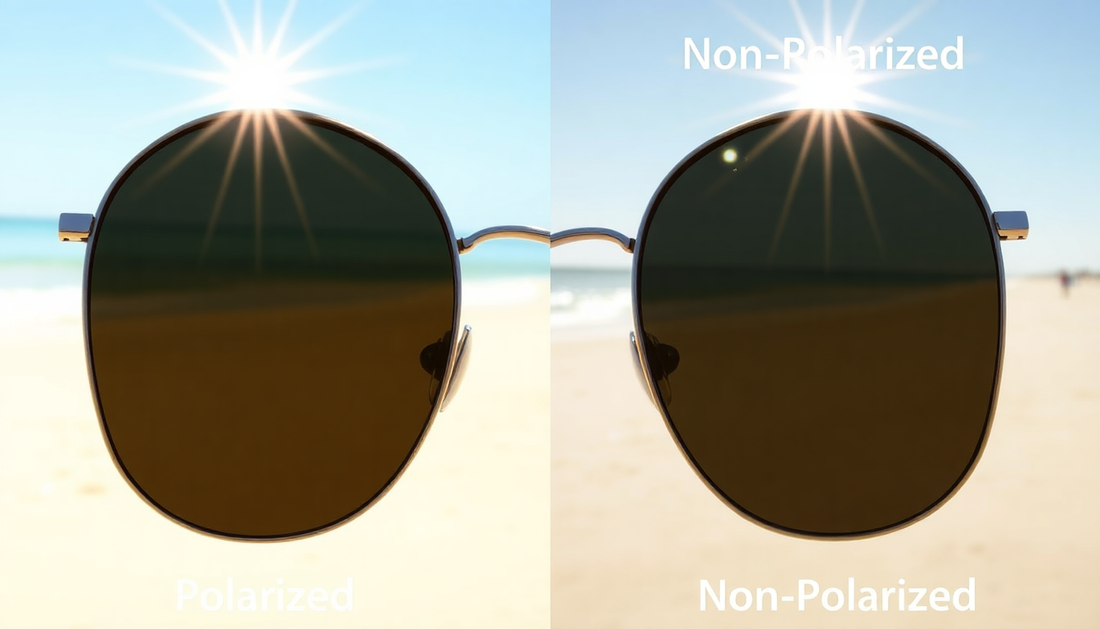
Polarized vs. Non-Polarized Sunglasses: What's the Difference?
Share
As the sun beams down and the summer heat starts to set in, finding the perfect pair of sunglasses becomes a top priority for many. While style and fashion are certainly important factors, the functionality and protection offered by your sunglasses should be a key consideration. One of the most significant differences between various sunglass options is whether they are polarized or non-polarized.
In this blog post, we'll dive deep into the world of polarized and non-polarized sunglasses, exploring the unique features, benefits, and drawbacks of each. By the end, you'll have a clear understanding of which type of sunglasses best suits your needs and lifestyle.
Understanding Polarized Sunglasses
Polarized sunglasses are designed to reduce glare and improve visual clarity by filtering out specific types of light. Glare is the intense reflection of light, often caused by surfaces like water, snow, or even the road. This glare can be uncomfortable and even dangerous, as it can impair your vision and make it difficult to see clearly.
Polarized lenses work by containing a special filter that blocks horizontal light waves, which are the primary culprit behind glare. This filter allows only vertical light waves to pass through, effectively reducing the amount of glare that reaches your eyes. As a result, polarized sunglasses provide a more comfortable and clear viewing experience, especially in bright, reflective environments.
Benefits of Polarized Sunglasses
-
Reduced Glare: The primary benefit of polarized sunglasses is their ability to significantly reduce glare, making it easier to see clearly in bright, reflective conditions.
-
Improved Visual Clarity: By filtering out horizontal light waves, polarized lenses enhance contrast and improve overall visual clarity, allowing you to see more details and better distinguish objects.
-
Enhanced Depth Perception: Polarized sunglasses can help improve depth perception, which is particularly useful for activities like driving, boating, or skiing, where depth cues are crucial for safety and performance.
-
Eye Strain Reduction: The reduced glare and improved visual clarity provided by polarized lenses can help alleviate eye strain, making them a great choice for extended outdoor activities or prolonged exposure to bright light.
Drawbacks of Polarized Sunglasses
-
Difficulty with LCD Screens: Polarized lenses can interfere with the display on some electronic devices, such as smartphones, tablets, or car dashboard screens, making it difficult to read the information on these screens.
-
Reduced Visibility in Low Light: Polarized lenses may slightly reduce the amount of light that reaches your eyes, which can be a disadvantage in low-light conditions, such as driving at night or in dimly lit environments.
-
Potential Distortion: In some cases, polarized lenses may cause minor distortion or color shifting, particularly when viewing certain types of reflective surfaces or objects.
Non-Polarized Sunglasses
Non-polarized sunglasses, on the other hand, do not contain the specialized filter found in polarized lenses. Instead, they rely on tinting or coatings to reduce the overall amount of light that reaches your eyes, providing a more general level of sun protection.
Benefits of Non-Polarized Sunglasses
-
Compatibility with Electronic Screens: Non-polarized sunglasses do not interfere with the display on electronic devices, making them a better choice for activities that involve frequent use of smartphones, tablets, or other screens.
-
Versatility: Non-polarized sunglasses can be a more versatile option, as they do not have the same limitations as polarized lenses when it comes to certain activities or environments.
-
Cost-Effectiveness: Non-polarized sunglasses are generally more affordable than their polarized counterparts, making them a more accessible option for those on a budget.
Drawbacks of Non-Polarized Sunglasses
-
Reduced Glare Reduction: Without the specialized filter, non-polarized sunglasses do not provide the same level of glare reduction as polarized lenses, which can be a significant drawback in bright, reflective environments.
-
Potential Eye Strain: The lack of glare reduction in non-polarized sunglasses may lead to increased eye strain, especially during prolonged exposure to bright light.
-
Limited Depth Perception: Non-polarized sunglasses do not offer the same level of depth perception enhancement as polarized lenses, which can be a disadvantage for activities that require accurate depth cues.
Choosing the Right Sunglasses
When it comes to choosing between polarized and non-polarized sunglasses, the decision ultimately depends on your specific needs and preferences. Consider the activities you'll be engaging in, the environments you'll be in, and the importance of features like glare reduction, compatibility with electronic screens, and cost.
If you spend a lot of time outdoors, especially in bright, reflective environments like on the water or the slopes, polarized sunglasses may be the better choice for you. They'll provide superior glare reduction and improved visual clarity, which can enhance your safety and enjoyment during these activities.
On the other hand, if you frequently use electronic devices or prefer a more versatile pair of sunglasses, non-polarized lenses may be the way to go. They won't interfere with your device screens and can be a more cost-effective option.
Ultimately, the choice between polarized and non-polarized sunglasses is a personal one, and it's worth trying out both options to see which best suits your needs and preferences.
Conclusion
Polarized and non-polarized sunglasses each have their own unique features and benefits, and the choice between the two ultimately comes down to your specific needs and preferences. By understanding the differences between these two types of sunglasses, you can make an informed decision and find the perfect pair to protect your eyes and enhance your outdoor experiences.
Whether you're an avid water sports enthusiast, a frequent driver, or simply someone who enjoys spending time in the great outdoors, the right pair of sunglasses can make all the difference in your comfort and visual clarity. So, take the time to explore your options and find the sunglasses that will keep your eyes safe and your vision clear, no matter where your adventures take you.
